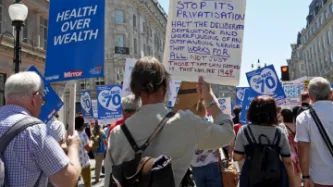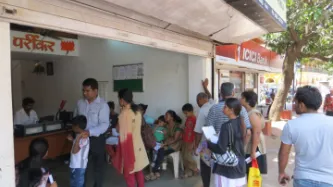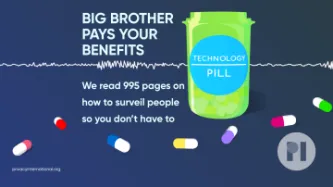Search
Content type: Long Read
Social protection programmes can be broadly understood as government support for individuals to meet basic human needs, protecting citizens from the “economic risks and insecurities of life”. These policies and programmes are essential to reducing the lifelong consequences of poverty and exclusion. Programmes like cash transfers – including child grants, school meals, skills development and more – help connect families with health care, nutritious food and quality education. To ensure that…
Content type: Advocacy
This report is presented by TEDIC (Technology and Community Association) and Privacy International (PI). TEDIC is a non-governmental, non-profit organization, based in Asunción, that promotes and defends human rights on the Internet and extends its networking to Latin America. PI is a London based human rights organization that works globally at the intersection of modern technologies and rights.
TEDIC and PI wish to express some concerns about the protection and promotion of the right to…
Content type: News & Analysis
Back in 2019, UK Health Secretary Matt Hancock announced a partnership between the NHS and Amazon Alexa. The goal of the partnership was for Alexa to be able to use the content of the NHS website when people asked health-related questions.At the time, we expressed a number of concerns regarding this agreement: Amazon did not appear to be an actor that should be trusted with our health information, and seeing the Health Secretary publicly praising this new agreement appeared to give…
Content type: News & Analysis
This article was written by Jamila Venturini from Derechos Digitales. The original version (in Spanish) is available here.
While at the international level there is a growing demand to ban the use of surveillance technologies until rigorous human rights standards are achieved, in Latin America we observe a new and silent tendency to acquire and use such systems to control access to social protection, i.e., to policies developed to reduce poverty, social vulnerability and exclusion…
Content type: Long Read
This piece was last updated in June 2021.
In many countries, access to social protection (such as welfare programmes or healthcare) is made conditional on producing a form of identification (“ID”). But obtaining a recognised and accurate ID is often a process riddled with discriminatory designs, bureaucracy and technical failures that prevent individuals from accessing the services they are entitled to. Even when people eventually get an ID, it might not accurately reflect who they are,…
Content type: Video
Content warning: this episode includes some disturbing stories of people who have died after having their benefits cut or withdrawn by the UK Department of Work and Pensions
Links
Find out more about the DWP's surveillance
Find out more about the DWP's alogrithim
You can find out more about each of the cases of people who died after their benefits withdrawn below:
Errol Graham
The 5,000
Jodey Whiting
Phillipa Day
David Clapson
If you're having problems navigating the UK's…
Content type: Explainer
You can access PI’s response to the consultation here.
This explainer is based on PI’s analysis and understanding of:
The Consultation text
The Draft Code of Data Matching Practice
The Cabinet Office’s data specifications for the public and private sector
The Cabinet Office’s 2015 case-studies both for the public and private sector
The Data Protection Impact Assessment for the current iteration of the National Fraud…
Content type: Long Read
Back in 2019, we read through a 1000-page manual released by the UK Department for Work and Pensions (DWP) describing how they conduct investigations into alleged benefits fraud. While out in the open and accessible to anyone, the guide turned out to be a dizzying dive into a world where civil servants are asked to stand outside someone’s door to decide if they are indeed single or disabled and have to be reminded that living together as a married couple is not an offense. The guide – which…
Content type: Long Read
In May 2019, the UK Department for Work and Pensions (DWP) – the department in charge of welfare – published their two-part staff guide on conducting fraud investigations. Privacy International went through the 995 pages to understand how those investigations happen and how the DWP is surveilling benefits claimants suspected of fraud.
Anyone who has flipped through a tabloid will have seen articles exposing the so-called “benefits-cheats,” people who allegedly trick the benefits systems for…
Content type: Examples
In December 2017, it was revealed that the large telco Bharti Airtel made use of Aadhaar-linked eKYC (electronic Know Your Customer) to open bank accounts for their customers without their knowledge or consent. eKYC is a way of using data in the UIDAI database as part of the verification process, which Airtel made use of for the issuing of SIM cards, and also secretly opened bank accounts with their Airtel Payments Bank. More than 2 million accounts could have been opened, receiving more than…








